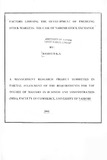| dc.description.abstract | The Kenyan stock market has experienced poor performance since it was formed in 1954.
Over these years, the market has experienced low turnover, low market capitalization and
the stagnation of the number of listed companies. This study was therefore designed to
identify factors limiting the development of emerging stock markets- The case of Nairobi
Stock exchange.
The study establishes that both external (macro economic and social cultural factors) and
market (legal, regulatory and institutional) factors have constrained the development of
the Kenyan stock market. External constraints identified are: low income (savings) levels,
corruption in the private and public sector, high corporate tax rates and investment
behaviors of "buy and hold" exhibited by Kenyan investors. The study also identified the
following market constraints: poor publicity of the opportunities available at the stock
market, absence of an automated trading system, insufficient number of products at the
stock market to attract the investing public (reason for illiquidity in market), lack of a
central Depository system (CDS), ceilings placed on foreign investor, restrictive rules
and regulation for both the NSE and CMA and inadequate disclosure of information by
listed companies.
The conclusion is that an integrated approach encom-pa.ssing both external and internal (market) factors should be used to foster the development of the stock market. This study
recommends a campaign to educate the Kenyan public, tax rebates for listed companies,
establishment of a central depository system, prudent macro economic policies, an
appropriate policy for collective investment schemes, NSE to implement automated
trading system, the regulators to playa supportive and facilitative role in addition to
being regulators, an appropriate corporate governance policy and a review of ceilings
placed on foreign investors. In addition, the Kenyan stock market should be market
oriented rather than being product oriented. | en |

